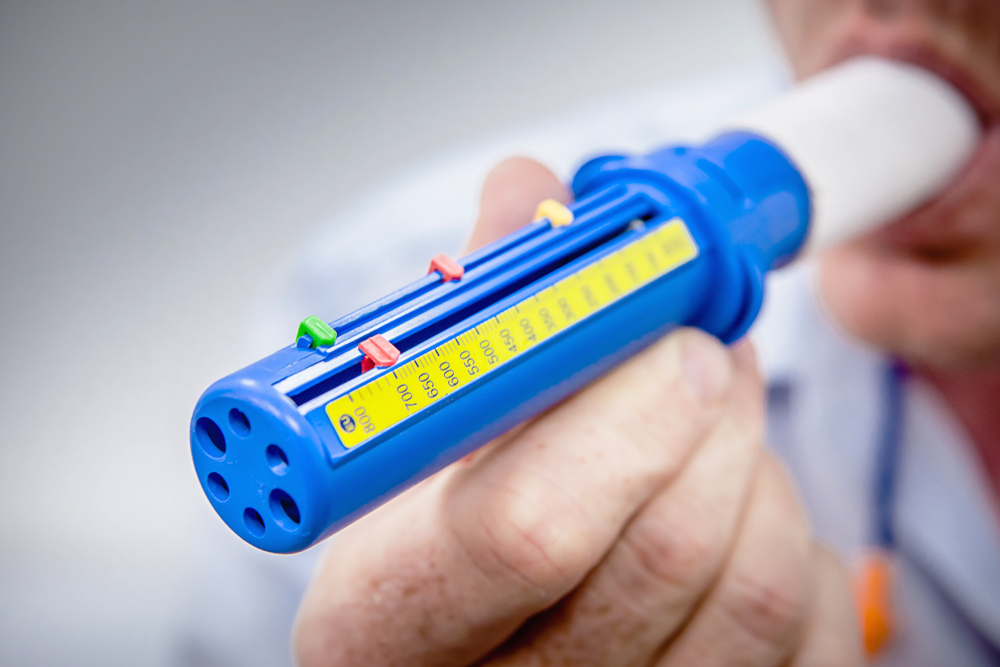ALS Patients’ Lung-function Decline Scores Can Predict Breathing Failure, Study Reports
Written by |

The rate of ALS patients’ lung-function decline can predict their risk of breathing failure, their need for assisted ventilation, and their risk of death, according to Cytokinetics, a company that develops muscle-disease therapies.
“These results suggest that respiratory function is an important prognostic indicator of clinical progression in people with ALS,” Dr. Fady I. Malik, Cytokinetics’ executive vice president of research and development, said in a press release.
The lung-muscle function yardstick that the researchers used was slow vital capacity. This is the amount of air a person can exhale slowly after filling their lungs slowly.
“Vital capacity is a key measure used by clinicians to measure disease progression during routine clinic visits, and this analysis reinforces its use to guide critical clinical management decisions,” Malik said.
ALS is a neurodegenerative disease whose early signs include problems with balance and moving. As the disease progresses, it also affects lung muscles, making breathing difficult.
Cytokinetics’ study appeared in the Journal of the American Medical Association Neurology. The title was “Association Between Decline in Slow Vital Capacity and Respiratory Insufficiency, Use of Assisted Ventilation, Tracheostomy, or Death in Patients With Amyotrophic Lateral Sclerosis.”
The analysis covered 893 ALS patients who received placebos rather than therapies in two large clinical trials and information on patients from an ALS trial database. The trials were the Phase 3 EMPOWER (NCT01281189) and the Phase 2 BENEFIT-ALS (NCT01709149) studies. The database was the Pooled Resource Open-Access ALS Clinical Trials or PRO-ACT collection.
The EMPOWER trial tested the ALS drug candidate dexpramipexole, while the BENEFIT-ALS trial tested tirasemtiv.
Researchers tracked patients’ SVC levels over time to determine their lung-function decline. In addition, they used EMPOWER trial data to see how declines in SVC correlated with lung-function problems that patients were treated for.
Patients’ average age was 57. Their SVC scores were 90 percent of normal when they entered the trials.
Researchers measured patients’ average rate of SVC decline by percentage points per month. The drops were almost identical across the two trials and the database. They were 2.73 points in the EMPOWER trial, 2.74 in the BENEFIT-ALS study, and 2.90 in the PRO-ACT database.
Basically the results showed that each month patients lost nearly 3 percent of their lung function.
“These findings provide information on the natural decline of SVC and suggest that there is a consistent average rate of decline in SVC among patients with ALS who participate in clinical trials,” the research team wrote.
In the EMPOWER study, two groups of patients had steeper SVC declines. The lung function scores of those 65 years and older dropped 3.6 percentage points per month. SVC declined 3.1 points in patients whose Revised ALS Functional Rating Score, or ALSFRS-R, was 39 or less before the study began.
“We found that younger age at disease onset and higher baseline ALSFRS-R total score, indicating better overall physical function at baseline, were both associated with slower declines in SVC,” the researchers wrote.
The team also found statistically significant declines in lung-function measures besides SVC. A deeper analysis showed that if the rate of SVC decline had been 1.5 percentage points a month less in the first six months of the study, patients’ risk of breathing failure or death would have decreased.
Overall, the results suggested that ALS patients experience a steady decline in SVC, which correlates with a higher risk of lung-function failure or death.
“We conclude that monitoring the rate of decline of SVC in patients with ALS can provide important prognostic information that is useful in their optimal clinical management,” the team wrote. “And observing changes in the rate of decline of SVC can be a clinically meaningful outcome measure for use in clinical trials.”





